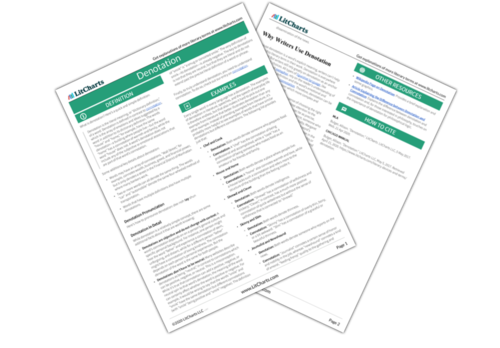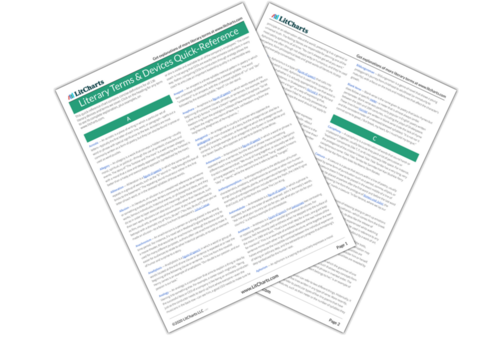Denotation
Denotation Definition
What is denotation? Here’s a quick and simple definition:
Denotation is the literal meaning, or "dictionary definition," of a word. Denotation is defined in contrast to connotation, which is the array of emotions and ideas suggested by a word in addition to its dictionary definition. The words "house" and "home," for example, have the same denotation—a building where people live—but the word "home" has a connotation of warmth and family, while the word "house" does not. A word's denotation does not include any of the subjective or emotional associations that are part of that word's connotation.
Some additional key details about denotation:
- Words may have an array of connotations. "Wall Street," for example, connotes wealth, business, greed, and financial power, but it only denotes a street in the Financial District of Manhattan where many bankers work.
- Two or more words can all denote the same thing. The words "car" and "automobile" denote the same four-wheeled method of transportation.
- Words that have multiple definitions also have multiple denotations.
Denotation Pronunciation
Here's how to pronounce denotation: dee-noh-tay-shun
Denotation in Detail
While denotation is a relatively simple concept, there are some additional facts about it that are worth knowing:
- Denotations are objective and do not change with context: A word's connotation depends on on a person's general culture and specific personal background. For instance, one person might hear the word "father" and experience a connotation of stern, unforgiving, and distant, while for a different person "father" might have a connotation of loving kindness. The connotation depends on each person's personal experiences. But the denotation of the word is the same for both people.
- Denotations don't have to be neutral: Many websites describe denotations as being "neutral," in contrast to connotations which can be positive, negative, or neutral. This is a misconception. While it's true that connotation can add a positive, negative, or neutral spin to that word's denotation, the meaning of the word can certainly affect whether the word is positive or negative. For example, it would be wrong to say that the words "smile" and "smirk" have the same denotation but different connotations (with "smile" being positive and "smirk" negative). The definition of "smirk" is "a smug or conceited smile." The very definition of smirk—its denotation—is already negative. The key to denotations is not that they are neutral, but that they are literal and do not extend past the precise literal definition of a word or phrase.
Finally, to truly understand denotation, you need to understand connotation. To do so, check out our entry on connotation.
Denotation Examples
Every single word in every language has a denotation. The examples of denotation in literature, speeches, and the speech of everyday life is therefore endless, but that also makes it hard to pick out one example from literature that better illustrates denotation than any other example. Instead of providing examples from literature, it's probably more helpful to see examples of words that have similar denotations but different connotations. The following list provides just that:
-
Chef and Cook
- Denotation: Both words denote someone who prepares food.
- Connotation: A "chef" has the connotation of being professional and accomplished, while a "cook" has a connotation of being someone who makes food as an amateur or for friends and family.
-
House and Home
- Denotation: Both words denote a place where people live.
- Connotation: A "home" also connotes warmth and love, while a house lacks such a connotation and refers more to the structure of the building than the feeling inside it.
-
Shrewd and Clever
- Denotation: Both words denote intelligence.
- Connotation: "Shrewd" has a connotation of selfishness and trickery; "Clever," in contrast, has a much more positive connotation of quick-wittedness but without the sense of selfishness that is connected to "shrewd."
-
Skinny and Slim
- Denotation: Both words denote thinness.
- Connotation: "Skinny" has a connotation of overly thin, bony, or a bit awkward. "Slim" has a connotation of a graceful or beautiful thinness.
-
Journalist and Newshound
- Denotation: Both words denote someone who reports on the news.
- Connotation: "Journalist" connotes a certain sense of honor and nobility in the job, whereas "newshound" connotes a kind of amoral, "feeding frenzy" quality to the gathering and dissemination of the news.
Why Writers Use Denotation
Because denotation is a word's explicit meaning, writers can't help but use this literary term in their work. Denotation is everywhere language is! But writers still rely greatly on denotation as an anchor for their artistic choices. All types of figurative language, like personification and metaphor, rely on the reader's understanding of both a word's explicit definition and the word's emotional and imaginative meaning—its connotation. Therefore, denotation can be understood as the bedrock upon which more complex and representative meanings are built.
Further, writers use denotation in the sense of choosing the right word for the right occasion. Writers pay close attention to the meaning of the words they use, so that they can be as precise, concrete, clear, and realistic as possible. For instance, someone who wrote, "When the doctor handed Margaret her new baby, Margaret smirked warmly at it," is misusing the word "smirk." The word's denotation—a smug or conceited smile—doesn't make sense in the context of the rest of the sentence. A writer can vastly improve his or her writing by paying close attention to the denotations of words and choosing those that best capture what the writer is trying to explain or describe.
Other Helpful Denotation Resources
- Wikipedia Page on Denotation: Provides a brief explanation and some graphics.
- Article Explaining the Difference between Denotation and Connotation: Explains the difference between denotation and connotation and, for those interested in philosophy, touches on the importance of denotation for philosophical logic.











